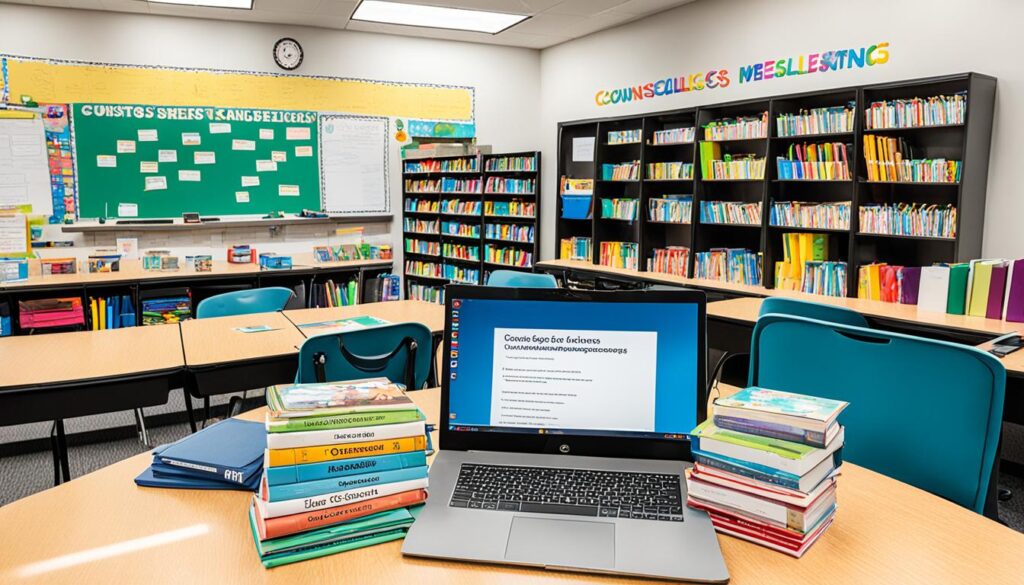Welcome to our article on promoting safe learning environments and the important role that education law plays in ensuring student safety. Education law is a crucial aspect of creating secure and inclusive schools where students can thrive both academically and emotionally. By providing legal support for education, it upholds the responsibility of schools and educational institutions to protect and nurture their students.
With a strong emphasis on promoting safe schools, education law establishes guidelines and regulations that help maintain a positive and supportive learning environment for all students. These laws ensure that students are protected from any form of harm and discrimination, and that their well-being is prioritized.
Through this article, we will explore the various facets of education law’s mission in promoting safe learning environments. We will delve into the legal frameworks that support equal opportunities, examine evidence-based strategies for student support, empower educators through professional development, champion diversity, address fair discipline policies, strategically use resources to improve school climates, and more.
Join us on this journey as we discover how education law shapes and safeguards safe learning environments for students across Australia.
Key Takeaways:
- Education law plays a crucial role in promoting safe learning environments.
- It establishes guidelines and regulations to protect students from harm and discrimination.
- Education law supports equal opportunities and inclusivity in schools.
- Evidence-based strategies are implemented to enhance student well-being.
- Professional development opportunities empower educators to create high-quality learning experiences.
The Vital Role of Education Law in Fostering Inclusive School Climates
Inclusive school climates are essential for creating a safe and supportive learning environment where all students can thrive. Education law plays a vital role in fostering such inclusive school climates by establishing legal frameworks and policies that promote equal opportunities and inclusivity in educational settings.
Understanding Inclusivity and Safety in Educational Settings
Creating an inclusive school climate means ensuring that every student, regardless of their background or characteristics, feels valued, respected, and supported. Inclusive schools prioritize the emotional, social, and academic well-being of every student, fostering an environment that celebrates diversity and promotes equity.
Education law provides the legal foundation for establishing and maintaining inclusive school climates. It encompasses various aspects, such as anti-discrimination laws, inclusive education policies, and regulations related to student safety. These laws and policies are designed to protect students from discrimination, bullying, and harassment, and to provide them with the support they need to succeed.
Legal Frameworks That Support Equal Opportunities
Equal opportunities in education are crucial for ensuring that every student has the chance to reach their full potential. Education law plays a pivotal role in establishing the legal frameworks that support these equal opportunities.
These legal frameworks include anti-discrimination laws that prohibit unfair treatment based on characteristics such as race, ethnicity, gender, disability, or sexual orientation. They also encompass policies and regulations that promote inclusive practices, such as providing reasonable accommodations for students with disabilities, ensuring language access for students with limited English proficiency, and creating a safe space for LGBTQ+ students.
By upholding these legal frameworks, education law helps create a level playing field for all students, regardless of their background or circumstances. It ensures that every student has the same access to educational resources, opportunities, and support, empowering them to succeed academically and personally.
| Benefits of Inclusive School Climates | Importance of Legal Frameworks |
|---|---|
|
|
Implementing Evidence-Based Strategies for Student Support
In order to promote student well-being and academic success, it is essential to implement evidence-based strategies for student support. These strategies are rooted in research and have been proven effective in addressing students’ social, emotional, and academic needs. By utilizing evidence-based education practices, educators and schools can create an environment that fosters student growth and achievement.
Evidence-Based Approaches to Enhance Student Well-Being
One crucial aspect of student support is enhancing their overall well-being. By prioritizing evidence-based approaches, educators can ensure that their efforts are grounded in proven methods. These approaches may include:
- Implementing social-emotional learning programs that promote self-awareness, self-management, social awareness, relationship skills, and responsible decision-making.
- Providing opportunities for student engagement and active learning, which have been found to positively impact student well-being and academic outcomes.
- Promoting a positive and inclusive school climate through the use of restorative justice practices and anti-bullying initiatives.
- Integrating mental health and wellness programs that support students’ emotional needs and provide access to appropriate resources.
By incorporating these evidence-based approaches, schools can create a supportive environment that nurtures students’ well-being, leading to improved overall success in their academic journey.

Empowering Educators: Education Law’s Role in Professional Development
Educators play a pivotal role in shaping the future of students. To ensure high-quality teaching and learning, continuous professional improvement is essential. Education law recognizes the significance of professional development in empowering educators and enhancing their skills and knowledge.
Education law provides legal support and resources for educators to engage in continuous professional development. These opportunities enable educators to stay updated with the latest research, teaching methodologies, and strategies that promote effective learning outcomes.
By investing in professional development, educators can:
- Acquire new teaching techniques and pedagogical strategies
- Enhance subject knowledge and expertise
- Stay informed about legal and ethical responsibilities
- Cultivate a positive classroom environment
Table: Examples of Professional Development Opportunities Supported by Education Law
| Professional Development Opportunities | Description |
|---|---|
| Workshops and Seminars | Engage in interactive sessions to acquire new knowledge and skills relevant to teaching and learning. |
| Conferences and Conventions | Participate in educational conferences and conventions to network with peers, learn from experts, and exchange best practices. |
| Online Courses and Webinars | Access self-paced online courses and webinars to enhance subject expertise, explore innovative teaching methods, and stay updated with educational trends. |
| Mentorship Programs | Receive guidance and support from experienced educators through mentorship programs, fostering professional growth and reflection. |
Education law promotes a culture of continuous learning and improvement among educators. By providing legal support for professional development, it ensures that teachers have the necessary resources and opportunities to thrive in their roles, resulting in enhanced student outcomes and overall educational excellence.
Championing Diversity: The Imperative for an Inclusive Educator Workforce
In today’s diverse and inclusive society, promoting diversity in education is not just a goal; it is a necessity. An inclusive educator workforce is crucial for creating an environment where all students can thrive academically, socially, and emotionally. By embracing diversity, schools and educational institutions can foster a sense of belonging and provide students with role models who reflect their own identities and experiences.
An inclusive educator workforce brings a multitude of benefits to the educational landscape. It broadens perspectives, encourages critical thinking, and promotes cultural awareness among both students and educators. By embracing diverse backgrounds, cultures, and perspectives, educators can create enriching learning experiences that prepare students for success in an interconnected world.
To champion diversity in schools, legal support plays a vital role. Education law supports initiatives that promote diversity and inclusion in educational institutions. It provides guidelines for hiring practices, professional development programs, and policies that encourage diverse representation among educators. By establishing legal frameworks that value diversity, education law helps ensure equal opportunities for all students and creates an inclusive learning environment that celebrates and respects differences.

“Diversity is the one true thing we all have in common. Celebrate it every day.” – Unknown
Education law encourages schools to implement strategies for recruiting and retaining a diverse educator workforce. It supports initiatives that address unconscious biases, provide equal opportunities for professional growth, and foster a culture of inclusion. By prioritizing diversity in hiring practices and creating supportive environments for all educators, schools can cultivate an inclusive educator workforce that reflects the diverse student population they serve.
In conclusion, promoting diversity in education, particularly through an inclusive educator workforce, is essential for creating a safe and inclusive learning environment. Education law provides the legal support and guidelines necessary to champion diversity and inclusion in schools and educational institutions. By embracing diversity, schools can prepare students to navigate a diverse world and foster a society that values and esteems the uniqueness of each individual.
Education Law Support for Fair Discipline Policies in Schools
In order to create safe and inclusive learning environments, education law plays a crucial role in supporting fair discipline policies in schools. These policies ensure that disciplinary practices are equitable, non-discriminatory, and promote disciplinary equity among students.
Mitigating Discrimination Through Legal Guidance
Educational institutions must adhere to legal guidelines when implementing discipline policies to avoid any form of discrimination. Education law provides valuable legal guidance that helps schools navigate complex disciplinary issues, mitigating the risk of discriminatory practices.
In order to foster a positive school climate, education law ensures that discipline policies consider the diverse needs and backgrounds of students, promoting fairness and inclusivity in disciplinary procedures.
Education Law’s Impact on Disciplinary Equity
Disciplinary equity is a key aspect of education law, as it seeks to eliminate disparities in disciplinary actions among different student populations. Education law mandates the development of policies that address disproportionate disciplinary actions, particularly those that negatively impact students of color and students with disabilities.
By promoting disciplinary equity, education law aims to create a supportive and unbiased learning environment, where all students have equal access to educational opportunities.
| Benefits of Education Law Support for Fair Discipline Policies | Key Considerations for Disciplinary Equity |
|---|---|
| – Ensures fair treatment of all students in disciplinary proceedings. | – Addressing the underlying causes of disproportionate disciplinary actions. |
| – Promotes transparency and accountability in disciplinary practices. | – Providing professional development opportunities for educators to adopt equitable disciplinary strategies. |
| – Supports the creation of safe and inclusive learning environments. | – Engaging students, parents, and school communities in developing and reviewing discipline policies. |
Strategic Use of Resources for Improving School Climates
In order to create a safe and inclusive learning environment, it is essential to strategically allocate resources and funds. By utilizing resources effectively, schools can enhance the overall school climate and support student well-being. This section will explore the importance of strategic resource allocation and discuss the opportunities for accessing both federal and local funding for school climate initiatives.
Accessing Federal and Local Funds for School Climate Initiatives
Obtaining financial support is crucial for implementing initiatives that improve school climates. Schools can explore various avenues to access both federal and local funds dedicated to education initiatives.
Federal Funding for Schools:
- Federal grants: Schools can apply for grants offered by the U.S. Department of Education to fund programs aimed at creating positive school climates.
- Title I funding: Schools with a high percentage of students from low-income families may qualify for Title I funds, which can be used to address school climate challenges.
- ESSA funding: The Every Student Succeeds Act (ESSA) provides funding opportunities for schools to support student well-being and create safe and inclusive learning environments.
Local Funding for Education Initiatives:
- Local school district budgets: Schools can tap into their local district’s budget to allocate funds for school climate improvement initiatives.
- Community partnerships: Schools can collaborate with local businesses, organizations, and philanthropic foundations that share a common interest in enhancing school climates.
- Parent-teacher associations: Schools can involve parent-teacher associations in fundraising efforts to support school climate initiatives and create a sense of community involvement.
By strategically utilizing the available resources and securing funding, schools can make significant progress in improving school climates and promoting student well-being.

Disproportionate Impact of Disciplinary Actions and Education Law Responses
Analyzing Disparities in Student Discipline
When examining the effects of disciplinary actions and education law responses, it becomes evident that certain student populations bear a disproportionate burden. Students of color and students with disabilities are among those who are disproportionately affected by disciplinary practices in educational institutions. Analyzing student discipline data reveals disparities that require attention and intervention.
Education law plays a crucial role in addressing and rectifying disciplinary disparities. By analyzing the data and identifying the root causes of these disparities, education law can help ensure fair and equitable disciplinary practices. Through legal guidelines and frameworks, education law promotes the importance of addressing disciplinary disparities to create a more inclusive and supportive learning environment for all students.
| Student Population | Disciplinary Disparities | Education Law’s Role |
|---|---|---|
| Students of Color | Experience higher rates of disciplinary actions compared to their white peers. | Educational laws provide guidance on fair and unbiased disciplinary practices, aiming to reduce disparities. |
| Students with Disabilities | Face disciplinary actions at alarmingly higher rates than students without disabilities. | Education law addresses the need for individualized disciplinary responses and support for students with disabilities. |
Addressing Disciplinary Disparities
To address disciplinary disparities, education law highlights the importance of implementing evidence-based strategies that consider the unique needs of diverse student populations. These strategies may include restorative justice practices, cultural competency training for educators, and the promotion of positive school climates.
By regulating and guiding disciplinary practices, education law contributes to fostering an environment that is fair, equitable, and supportive for all students. It ensures that disciplinary actions are not disproportionately targeting certain student groups based on their race, ethnicity, or disability status.
Through ongoing analysis and evaluation of disciplinary data, education law continues to evolve, providing guidelines and promoting fairness in disciplinary practices. By addressing disciplinary disparities, education law aims to create an educational environment that respects the rights and dignity of all students, enabling them to succeed academically and personally.
Integrating Student Mental Health Needs with Educational Policies
This section will explore the integration of student mental health needs with educational policies. It is crucial to address mental health issues in the educational setting to create a supportive environment for students. Education law plays a vital role in supporting mental health initiatives and ensuring students’ well-being. In addition, legal services are available to provide necessary support and resources to address the intersection of mental health and discipline in schools.
Legal Services Addressing the Intersection of Mental Health and Discipline
Educational policies that prioritize student mental health are essential for creating a conducive learning environment. When mental health concerns intersect with disciplinary actions, legal services can provide guidance and support. These services help schools and educators navigate the legal implications of addressing mental health needs while maintaining fair disciplinary practices.
Legal professionals specializing in education law can offer assistance in the following areas:
- Reviewing and developing policies related to student mental health
- Providing legal guidance on disciplinary actions involving mental health considerations
- Ensuring compliance with relevant laws and regulations
- Advocating for the rights of students with mental health challenges
- Offering training and professional development for educators on mental health issues
The intersection of mental health and discipline requires a comprehensive approach that considers legal, ethical, and student well-being aspects. Legal services play a critical role in navigating this complex landscape, ensuring that students’ mental health needs are integrated into educational policies and disciplinary practices.
| Legal Services for Mental Health Support |
|---|
| Reviewing and developing policies related to student mental health |
| Providing legal guidance on disciplinary actions involving mental health considerations |
| Ensuring compliance with relevant laws and regulations |
| Advocating for the rights of students with mental health challenges |
| Offering training and professional development for educators on mental health issues |
Conclusion
In conclusion, education law plays a vital role in promoting safe learning environments for students. By upholding student safety, inclusivity, and well-being, education law ensures that every student has the opportunity to thrive academically, socially, and emotionally. Through its legal frameworks and policies, education law supports equal opportunities in education, fosters an inclusive educator workforce, and addresses disciplinary disparities.
Looking to the future, education law will continue to evolve to meet the changing needs of the educational landscape. With a focus on student protection, future directions in education law will prioritize the implementation of evidence-based strategies for student support and the integration of student mental health needs into educational policies. By providing legal guidance, resources, and support, education law will play a crucial role in creating a safe and inclusive learning environment for all students.
FAQ
What is the mission of education law in promoting safe learning environments?
The mission of education law is to create and maintain secure and inclusive environments for students, where they can thrive academically, socially, and emotionally. Education law supports schools and educational institutions in upholding student safety and well-being.
How does education law foster inclusive school climates?
Education law fosters inclusive school climates by promoting equal opportunities in education. It supports the implementation of anti-discrimination laws and inclusive education policies that create a safe and welcoming environment for all students.
What are evidence-based strategies for student support in education law?
Evidence-based strategies for student support in education law refer to research-backed approaches that enhance student well-being and promote their success in the educational setting. These strategies address students’ social, emotional, and academic needs.
How does education law empower educators through professional development?
Education law empowers educators through professional development opportunities. It builds their capacity for high-quality teaching and learning and fosters continuous professional improvement. Education law provides legal support and resources to enhance educators’ skills and knowledge.
Why is championing diversity important in education?
Championing diversity in education, particularly in the educator workforce, is crucial because it creates an inclusive environment for students. Having a diverse group of educators has a positive impact on students and promotes equal opportunities for all. Education law supports and promotes diversity and inclusion in schools and educational institutions.
How does education law support fair discipline policies in schools?
Education law supports fair discipline policies in schools by guiding the implementation of disciplinary practices that are equitable and non-discriminatory. It aims to mitigate discrimination and promote disciplinary equity in schools.
How can resources be strategically used to improve school climates?
Resources can be strategically used to improve school climates by allocating them effectively to enhance the overall learning environment and support student well-being. Education law provides opportunities for accessing federal and local funds for school climate initiatives, emphasizing the importance of financial support in creating a safe and inclusive school environment.
What is the role of education law in addressing disciplinary disparities?
Education law plays a role in addressing disciplinary disparities by recognizing and addressing the disproportionate impact of disciplinary actions and education law responses on certain student populations. It aims to promote fairness in disciplinary practices and reduce disparities.
How does education law support the integration of student mental health needs with educational policies?
Education law supports the integration of student mental health needs with educational policies by providing legal services and resources to address the intersection of mental health and discipline in schools. It recognizes the importance of addressing mental health issues in the educational setting.
How does education law contribute to promoting safe learning environments?
Education law plays a crucial role in promoting safe learning environments by upholding student safety, inclusivity, and well-being. It supports schools and educational institutions in creating and maintaining secure and inclusive environments. It also takes into account the evolving needs of the educational landscape and protects students through legal measures.
What are the future directions in education law for student protection?
The future directions in education law for student protection include addressing emerging challenges and evolving needs of students. This may involve updating policies and regulations to ensure the safety and well-being of students in the rapidly changing educational landscape.
Source Links
- https://dropoutprevention.org/effective-strategies/safe-learning-environments/
- https://www2.ed.gov/policy/gen/guid/school-discipline/guiding-principles.pdf
- https://www2.education.vic.gov.au/pal/environmental-sustainability-schools/print-all

